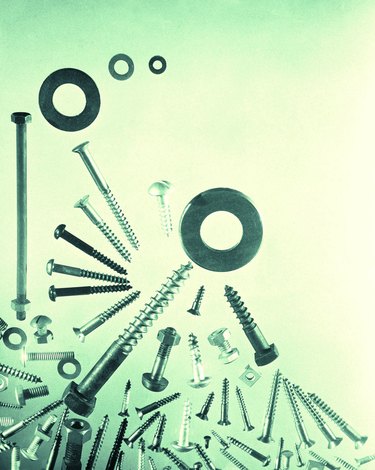
When working on a DIY project or having work completed by a professional, using the correct tools and equipment is paramount to achieving long-lasting results. The range of fasteners for projects can seem endless, whether you're considering nails, staples or screws. The screw choices include wood screws, machine screws, sheet metal screws and drywall screws. Within each group there are further differences to consider, including size, threads and even color.
Drywall Screws
Video of the Day
As the name implies, a drywall screw is used to fasten drywall — wallboard made of a heavy paper-coated layer of gypsum — to framing. The drywall screw is constructed with either coarse or fine threads. The choice of which to use is determined by the type of framing, whether wood (coarse) or metal (fine).
Video of the Day
Coatings
The drywall screw, threaded its whole length to aid in installation, will have its steel length coated in zinc or phosphate. The phosphate coating, which is black in appearance, is preferred, as it is the more rust-resistant. However, this does not sanction use in wet or exterior situations. Zinc-coated screws, when they begin to rust, will damage any plaster and wall finish applied over them.
Why Phosphate
Phosphate coatings increase an item's resistance to rust. Additionally, a phosphate coating negates the need for a more expensive paint process. In drywall applications, the screw will be covered in the finished product, where the appearance/color is not a consideration. In instances where exposed metal is part of the finished product, a phosphate coating will convey an even finish while inhibiting corrosion.
Screws vs. Nails
Before the drywall screw, the common practice was to use drywall nails when installing drywall. Experimentation indicated that screws were able to withstand three and a half times the pullout pressure of a comparable drywall nail. In addition to this holding power, application was quicker, which translated into cost savings during construction.